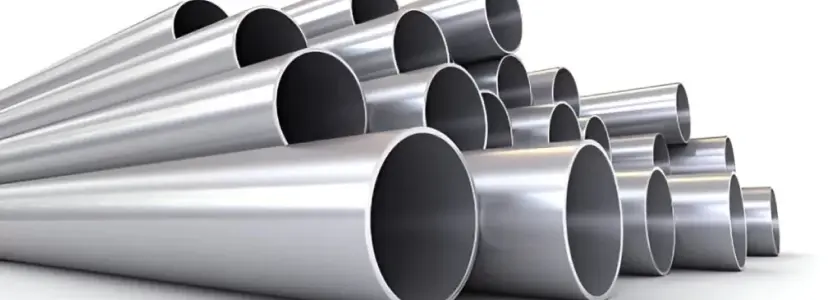

Alloy steel tubes are widely used in various industries due to their excellent strength, durability, and resistance to high temperatures and pressure. At Om Steel, we specialize in manufacturing and supplying high-quality alloy steel tubes that are designed to meet the diverse needs of our clients.
Our alloy steel tubes come in a wide range of sizes and grades, making them suitable for use in various applications. We offer both seamless and welded tubes, and we can customize them to meet your specific requirements.
One of the key features of our alloy steel tubes is their excellent resistance to corrosion and wear and tear, ensuring long-lasting performance in harsh environments. Our products are also highly ductile, making them easy to fabricate and install.
At Om Steel, we use the latest technology and manufacturing techniques to ensure that our products meet the highest quality standards. Our team of experts is always available to provide you with the necessary guidance and support to ensure that you get the right product for your specific application.
Types of Alloy Steel Tubes
Alloy Steel Boiler Tubes
Alloy Steel Square Tubes
Welded Tubes
Seamless Tubes
Alloy Steel Round Tubes
Alloy Steel Rectangular Tubes
Alloy Steel Hydraulic Tubes
Alloy Steel Heat Exchanger Tubes
Alloy Steel Instrumentation Tubes
Characteristics of Alloy Steel Tubes in Piping Systems
Corrosion Resistance
Strength and Durability
Flexibility
Cost-Effective
Resistance to High Temperatures
Ease of Welding
Low Maintenance Requirements
Alloy steel tubes require very little maintenance over their lifetime. Unlike some other materials that may corrode or degrade over time, alloy steel maintains its strength and durability for many years with minimal upkeep. This makes it an ideal choice for applications where maintenance is difficult or costly.
Alloy steel tubes
specifications
| Specifications | ASTM A 335 ASME SA 335 |
|---|---|
| Dimensions | ASTM, ASME and API |
| Size | 1/8″NB TO 30″NB IN |
| Tubing Size | 1 / 2” OD up to 5” OD, customs diameters also available |
| Outer Diameter | 6-2500mm; WT:1-200mm |
| Schedule | SCH20, SCH30, SCH40, STD, SCH80, XS, SCH60, SCH80, SCH120, SCH140, SCH160, XXS |
| Grade | STM A335 Gr. P5, P9, P11, P12, P21, P22 & P91, ASTM A213 – T5, T9, T11, T12, T22, T91, ASTM A691 |
| Length | Within 13500mm |
| Type | Seamless / Fabricated |
| Form | Round, Hydraulic Etc |
| Length | Single Random, Double Random & Cut Length. |
| End | Plain End, Beveled End, Treaded |
ASME SA335 Alloy Tube
Outside Diameter & Tolerance
| ASTM A450 | Hot rolled | Outside Diameter, mm | Tolerance, mm |
| OD≤101.6 | -0.5 | ||
| 101.6<OD≤190.5 | -0.3333333333 | ||
| 190.5<OD≤228.6 | -0.25 | ||
| Cold Drawn | Outside Diameter, mm | Tolerance, mm | |
| OD<25.4 | ±0.10 | ||
| 25.4≤OD≤38.1 | ±0.15 | ||
| 38.1<OD<50.8 | ±0.20 | ||
| 50.8≤OD<63.5 | ±0.25 | ||
| 63.5≤OD<76.2 | ±0.30 | ||
| 76.2≤OD≤101.6 | ±0.38 | ||
| 101.6<OD≤190.5 | -0.59375 | ||
| -0.3333333333 | – | ||
| – | ASTM A530 & ASTM A335 | Outside Diameter, inch | Tolerance, mm |
| 1/8≤OD≤1-1/2 | NPS | ±0.40 | |
| 1-1/2<OD≤4 | ±0.79 | ||
| 4<OD≤8 | -2.012658228 | ||
| 8<OD≤12 | -3.012658228 | ||
| OD>12 | – |
ASME SA335 Alloy Steel tubes
Wall thickness
| STM A450 | Hot rolled | Outside Diameter, mm | Tolerance, % |
| OD≤101.6, WT≤2.4 | +40/-0 | ||
| OD≤101.6, 2.4<WT≤3.8 | +35/-0 | ||
| OD≤101.6, 3.8<WT≤4.6 | +33/-0 | ||
| OD≤101.6, WT>4.6 | +28/-0 | ||
| OD>101.6, 2.4<WT≤3.8 | +35/-0 | ||
| OD>101.6, 3.8<WT≤4.6 | +33/-0 | ||
| OD>101.6, WT>4.6 | +28/-0 | ||
| Cold Drawn | Outside Diameter, mm | Tolerance, % | |
| OD≤38.1 | +20/-0 | ||
| +22/-0 | – | ||
| – | ASTM A530 | Outside Diameter, inch | Tolerance, % |
| 1/8≤OD≤2-1/2 | NPS | -1.6 | |
| 3≤OD≤18, WT/OD≤5% | -1.8 | ||
| 3≤OD≤18, WT/OD>5% | -1.2 | ||
| OD≥20, WT/OD≤5% | -1.8 | ||
| OD≥20, WT/OD>5% | – |
Alloy Steel Tubes
Heat Treatment
| P5, P9, P11, and P22 | |||
|---|---|---|---|
| Grade | Heat Treatment Type | Normalizing Temperature Range F [C] | “Subcritical Annealing or Tempering Temperature Range F [C]” |
| P5 (b,c) | Full or Isothermal Anneal | – | – |
| – | Normalize and Temper | – | 1250 [675] |
| – | Subcritical Anneal (P5c only) | – | 1325 – 1375 [715 – 745] |
| P9 | Full or Isothermal Anneal | – | – |
| – | Normalize and Temper | – | 1250 [675] |
| P11 | Full or Isothermal Anneal | – | – |
| – | Normalize and Temper | – | 1200 [650] |
| P22 | Full or Isothermal Anneal | – | – |
| – | Normalize and Temper | – | 1250 [675] |
| P91 | Normalize and Temper | 1900-1975 [1040 – 1080] | 1350-1470 [730 – 800] |
| – | Quench and Temper | 1900-1975 [1040 – 1080] | 1350-1470 [730 – 800] |
Application Industry
Serving Diverse Sectors with Precision & Performance
Om Steel supplies premium steel and alloy products to a wide range of industries, ensuring strength, durability, and performance in every application. From construction, oil & gas, and automotive to power plants, shipbuilding, and chemical processing — our materials meet the demands of critical operations. Trusted by industry leaders, we deliver solutions that stand up to the toughest challenges.
Defence & Aerospace
Oil/Gas
Speciality Valves & Vacuum
Precision Components
Defence & Aerospace
Oil/Gas
Speciality Valves & Vacuum
Precision Components
Explore Our
Products
Continue Reading on Similar Topics
Ask Anything
Do you have any questions?







